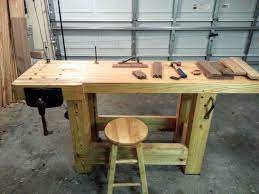
Woodworking is an age-old craft, a perfect blend of skill and creativity. Perhaps you’ve recently started dabbling in woodworking and found that it’s a hobby you genuinely enjoy. Or maybe it’s a pastime you’ve loved for years, and you’ve developed some serious skills. Either way, you might be considering how you can turn this beloved hobby into a profitable business.
Here are five strategies that will help you transform your passion for woodworking into a successful entrepreneurial venture.
1. Identify Your Niche
Not all woodworking is created equal. Some woodworkers specialize in making small, intricate items like jewelry boxes or chess pieces. Others might prefer creating large pieces of furniture, like dining room tables or bed frames. Identifying what you excel in and enjoy most will help you find your unique place in the market. Once you know your niche, Woodwork101 offers a comprehensive program to master those specific skills.
2. Understand Your Market
Once you’ve defined your niche, it’s important to understand the market for your products. Conduct market research to discover who your potential customers are, what they’re looking for, and what they’re willing to pay. Is there a demand for sustainable, handcrafted furniture? Or are consumers seeking unique, artistic pieces for their homes? Also, consider your competition and find ways to differentiate your products.
3. Price Your Work Correctly
Determining how to price your work can be one of the most challenging aspects of turning your hobby into a business. It’s essential to consider the cost of materials, the time it takes to create each piece, and the level of skill required. This fascinating piece on innovative inventions by ordinary people offers insight into the worth of craftsmanship and ingenuity.
4. Create a Business Plan
Every successful business begins with a solid business plan. This should include details about your target market, how you plan to sell your products, and how much you expect to earn. Your business plan will serve as a roadmap for your venture and help you stay focused and on track.
5. Market Your Business
Now that you’ve defined your niche, understood your market, priced your products, and created a business plan, it’s time to get the word out. Utilize social media, local events, and word of mouth to spread awareness about your woodworking business. Make sure your craftsmanship and love for your work shine through in everything you do.
Turning your woodworking hobby into a profitable business is a journey that requires planning, passion, and persistence. But with the right approach and resources, like Woodwork101, it is entirely within your grasp. So why not take your love for woodworking to the next level? As this article on human ingenuity shows, taking a step into the unknown might just lead to an incredibly rewarding venture.
Develop Skills and Expand Knowledge
If you’re venturing into the business world of woodworking, one of the most vital aspects you should focus on is enhancing your skills. This doesn’t mean you need to master every woodworking technique under the sun, but you should be well-versed in your niche. Attend workshops, watch tutorials, or even consider mentorship under a professional woodworker. Continually learning and growing will not only improve your craft but also ignite your passion and creativity, vital ingredients in making your business thrive.
Branding and Online Presence
Branding is more than just a catchy logo or a well-designed website; it’s about creating an identity that tells your story and resonates with your target market. Are you an eco-conscious artisan crafting sustainable furniture? Or a skilled artist creating intricate wood carvings? Your brand should reflect who you are and what you stand for. In the digital era, a strong online presence is crucial for any business. A well-crafted website and engaging social media can serve as powerful tools for showcasing your work and connecting with customers.
Building a Supportive Network
Starting a business can feel like a solitary journey, but it doesn’t have to be. Networking with other woodworkers, joining local craft associations, or even partnering with local businesses can create opportunities and provide support. This network can offer valuable advice, provide a sense of community, and open doors to collaborative projects. Furthermore, satisfied customers are often the best marketers. Encourage your clients to share their experience with friends and family, or write reviews, and you’ll find your business growing organically through word of mouth.

